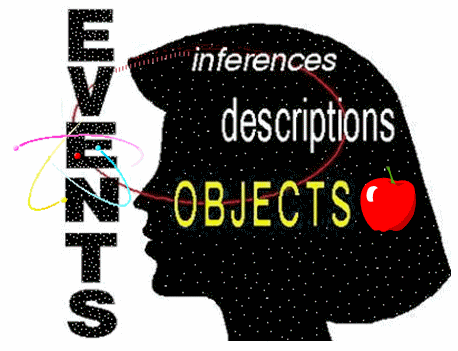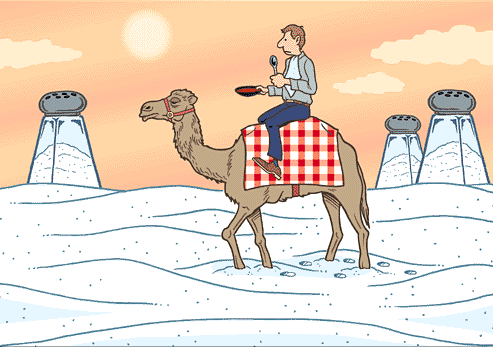
"What 'is' Salt?"
Written by Steven Lewis, 1995.IN THE SPRING of '76 I enrolled in an epistemology class at the University of Kansas, primarily because Korzybski had spoken favorably of this branch of philosophy and I wanted to learn more. I should have realized I was cruising for a bruising, because Aristotle's writings were scheduled to take up almost a third of the course, and the most recent philosopher we would evaluate would be David Hume.
On the first day of class the instructor, J. Michael Young (1944-95), gave me the first of many lessons in the difficulties of general semantics. He asked the class, "What is salt?" One student replied "sodium chloride." Another replied "a white crystalline powder." Another replied "a food flavorer." Eventually, and dramatically, the instructor notified us that we had only reported what we do with salt and what salt is made of. None of us had reported, however, what salt IS.
I almost couldn't believe my ears. My hand shot up, and in my youthful innocence I said, "Whatever you say salt is, it is not, for it is not words." For a brief moment I fantasized that I might be awarded a special scholarship. The instructor stared at me for a moment and no one said anything. Just when I thought he was going to invite me to be guest lecturer he said, "Of course, salt is not the word. But you haven't told me what salt is."
Clearly, he was going to be a hard nut to crack, but I continued: "The white crystalline stuff that you put on your food exists on the nonverbal level. The word 'salt' exists on the verbal level. Anything we say about the nonverbal salt will be on the verbal level. What the others said about salt -- what it is made of, what we do with it -- gives us structural information about salt. This is revealing because once we differentiate between the verbal and nonverbal levels, structure can be the only link between them."

There seemed like the longest pause, then my instructor replied, "Yes, but they did not tell me what salt is, and neither have you."
From this point on the instructor called on me sparingly in class. I think he thought I must have been asked to enroll in his class by his tenure committee. We were graded that semester on the basis of several papers we were to write evaluating the material we read for the class. I continued a general semantic analysis in each of these papers, to the chagrin of my instructor. In the first paper I analyzed our readings from Aristotle from the standpoint of Korzybski. My instructor asked me to rewrite the paper twice, but never assigned a grade. He kept saying he didn't understand my points, and that I wasn't really "doing philosophy" anyway. Near the end of the semester I had turned in 7 papers, but had only two grades ... B and B-. On my last paper he wrote "please see me" and at that meeting asked me to drop the class. He said he didn't feel he could grade my work, and would let me out of the class ungraded if I would agree to depart peacefully. In the end, I didn't get my special scholarship; instead, I got the boot.
I guess you could say that my excursion into the philosophers' den made me empathize with Korzybski's evaluation on page 77 of Science and Sanity. It also made me realize that, regardless of Korzybski's verbosity, gs can be especially difficult for those who have a lifetime investment in the confusion of the orders of abstraction. I never was able to get my epistemology instructor to feel the difference between the verbal and nonverbal levels. Later I figured this is at least partly related to the need to visualize the korzybskian theory. Korzybski fussed so much about training with the Structural Differential because he knew you had to learn to visualize his theory in order to fully understand and apply it. I never got my philosophy teacher to visualize the levels of abstraction, and so he never got it.
If we learn to visualize the different orders of abstraction, then we can see how the only relationship between the verbal and nonverbal levels must be structural. When we answer a question like 'what is salt' we will report back structural data, such as its composition, where it is found, what we use it for .... We won't try to force the verbal level to be the nonverbal level, or be depressed that it cannot. If we want to evaluate nonverbal salt on its level, we must be silent and look, touch, taste ... but not speak!
Daniel Greenwald reponds ||| General Semantics Home Page ||| Steven Lewis Home Page